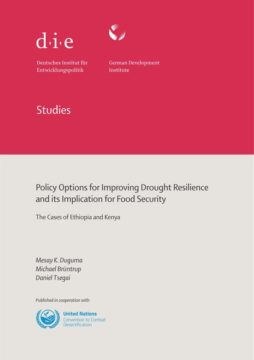Drought is arguably one of the most devastating natural disasters in developing countries, particularly in Africa. Climate change is expected to add to this threat. Drought has far-reaching socio-economic and ecological implications that include loss of lives and livelihoods, famine, lack of water for human use and livestock, pasture and crops, diminishing energy production, and loss of assets. Further, it fuels local conflicts around natural resources, and catalyses internal and international migration. However, solutions are at hand to mitigate the effects of droughts even in poor countries and vulnerable communities, and there is an ever increasing urgency to establish drought preparedness and to improve the resilience of communities, regions and ecosystems. Drought preparedness strategies need to be pro-active, adaptable and context-specific to the drought situation, and have to include many sectors as well as emergency assistance.
This study, jointly prepared by DIE and UNCCD, presents and critically examines the drought policies and institutional frameworks of two African countries frequently challenged by droughts – Ethiopia and Kenya. These countries are known to have embarked upon robust drought strategies during the last years, in particular since the last devastating drought of 2010/2011. Lessons learnt, the policy implementation challenges and relevant measures are discussed. The study is based on a literature review complemented by interviews with about 50 key stakeholders along with field visits in Ethiopia and Kenya in the first half of 2016. The study presents a number of recommendations on how to strengthen drought policies in these two countries which may be valuable to relevant actors in other drought-prone African countries and beyond.
- Veröffentlicht am Samstag 14. Dezember 2024 von Deutsches Institut f. Entwicklungspolitik
- ISBN: 9783960210566
- 103 Seiten
- Genre: Gesellschaft, Politik, Sachbücher, Wirtschaft
